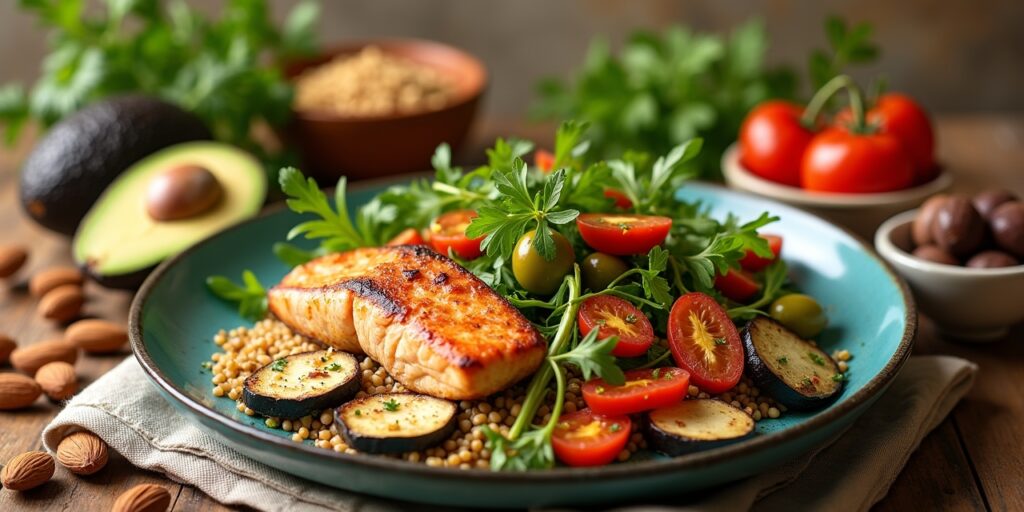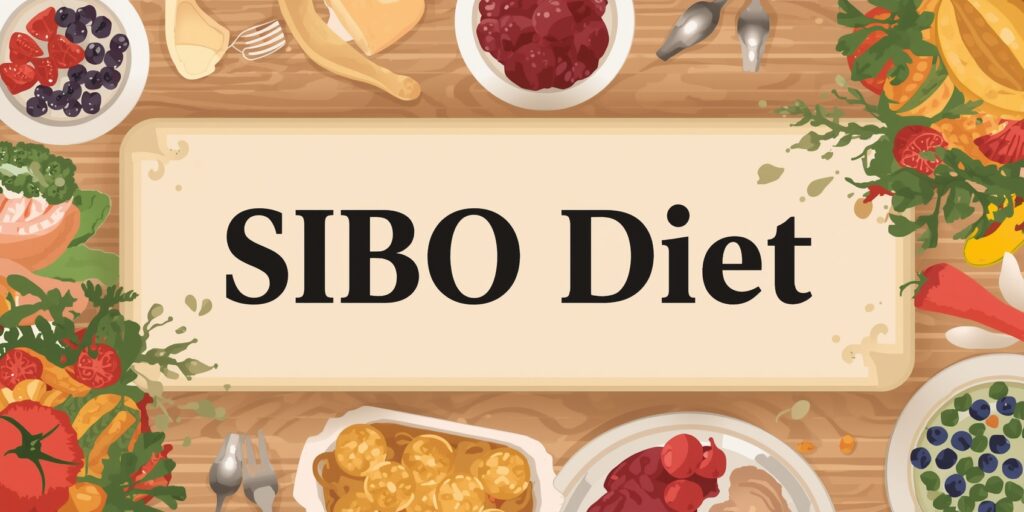“Learn about the Mediterranean diet, which is a great way to lose weight and stay healthy. Discover what it can do for you, what foods to eat, meal ideas, and how it can help you live a balanced life.
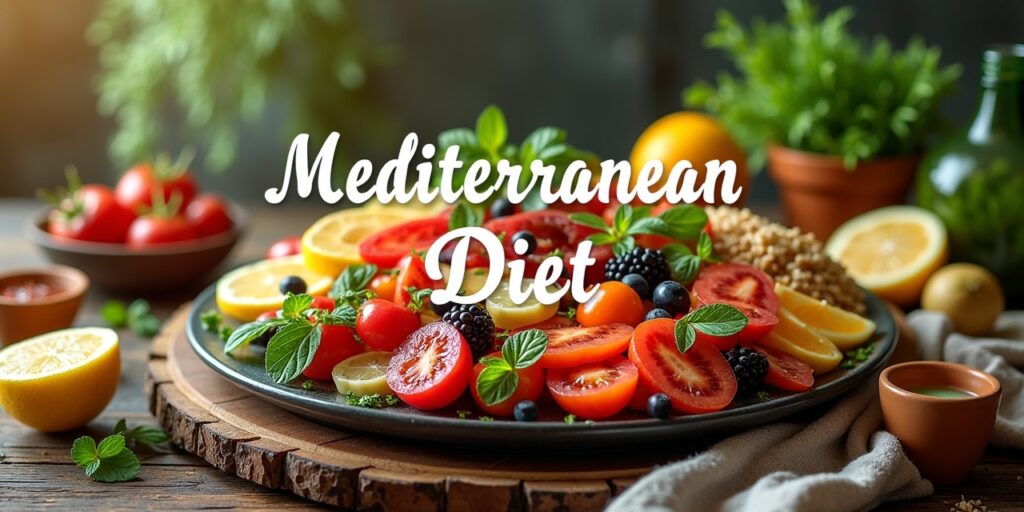
The Mediterranean diet is one of the most popular ways of eating in the world, and for good reason. In addition to helping you lose weight over time, it has many health benefits, such as reducing inflammation, improving heart health, and boosting brain function. The diet is based on the eating habits of people living near the Mediterranean Sea. It includes plenty of fruits, vegetables, whole grains, lean proteins, and healthy fats.
This complete guide will focus on the benefits of the Mediterranean diet, food suggestions, meal ideas, and how it can help you lose weight while eating delicious and healthy food.
What is the Mediterranean diet?
The Mediterranean diet is based on how people in Italy, Greece, Spain, and southern France used to eat.
The main components of the diet are:
- Plant-based foods: Focus on nuts, legumes, fruits, and Vegetables.
- Healthy Fats: Predominantly from olive oil, which is used as the main cooking fat.
- Whole Grains: Foods like brown rice, whole wheat bread, and oats are staples.
- Fish and seafood: Choose fatty fish like salmon, sardines, and mackerel.
- Lean proteins: include chicken and sometimes dairy products like Greek yogurt and cheese.
- Not much red meat: People eat red meat only once a month.
The Mediterranean diet focuses on whole, unprocessed foods and natural ingredients that are rich in nutrients. It gives you a balance of macronutrients that helps you lose weight in a healthy way.
Mediterranean diet some great benefits:
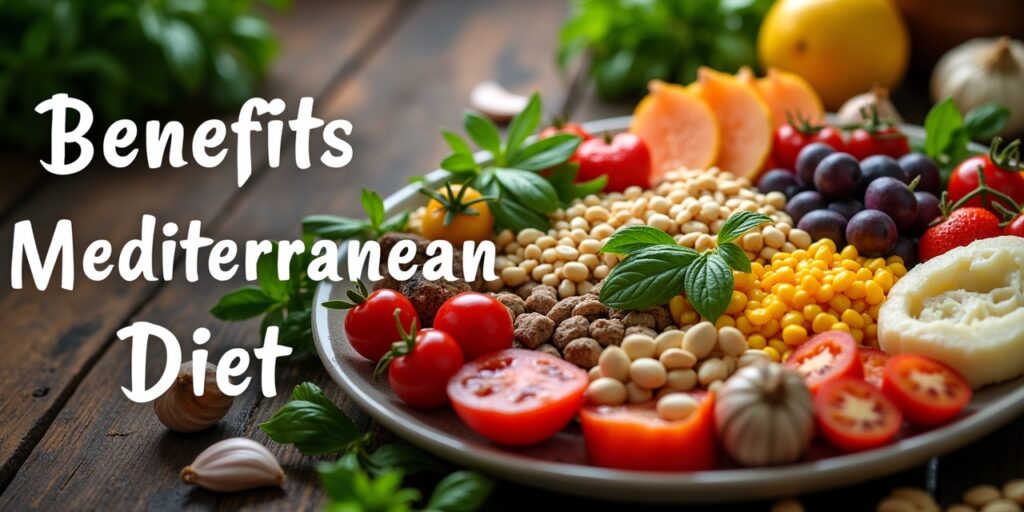
1. Weight Loss:
The Mediterranean diet is a great way to lose weight because it doesn’t have a lot of processed foods or refined sugar. Eating plenty of fiber from fruits, vegetables, and whole grains can help you feel fuller for longer and prevent you from overeating. Olive oil and nuts are healthy There are also good sources of fat that help control appetite and speed up metabolism.
2. Heart health:
A Mediterranean diet high in monounsaturated fats like olive oil has been linked to a reduced risk of heart disease. This diet is high in omega-3 fatty acids, which come from fish. It has been shown to lower LDL cholesterol, raise HDL cholesterol, and lower blood pressure.
3. Reduced inflammation:
Tomatoes, leafy greens, nuts, and fatty fish are all foods that are high in antioxidants and anti-inflammatory compounds. Chronic inflammation is linked to many diseases, including diabetes, heart disease, and cancer. By following a Mediterranean diet, you can significantly reduce inflammation in your body.
Read More: Carnivore Diet Recipe: A Comprehensive Guide
4. Better brain function:
Research has shown that a Mediterranean diet can help keep your brain healthy as you age and protect against neurodegenerative diseases like Alzheimer’s. The diet is packed with antioxidants, healthy fats, and omega-3 fatty acids, Which helps keep the brain healthy and functioning well.
5. Better blood sugar control:
You can manage and prevent type 2 diabetes by following the Mediterranean diet. It emphasizes foods with a low glycemic index, meaning they release sugar into the blood slowly, preventing insulin spikes and crashes. Whole grains and legumes are other foods that are high in fiber. Fiber slows down digestion and helps stabilize blood sugar levels.
What to Eat on a Mediterranean Diet:
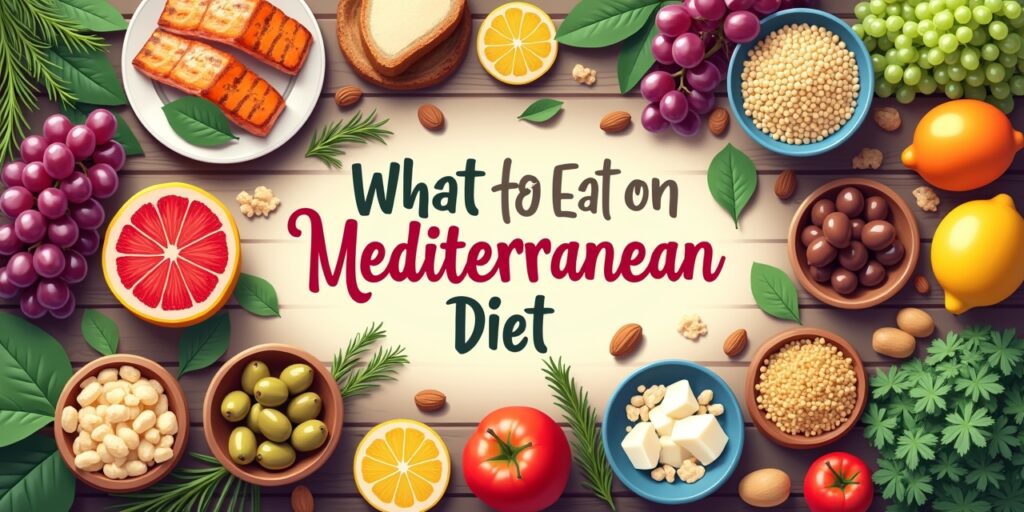
The Mediterranean diet includes a variety of foods that are rich in nutrients. So here is a list of foods that you can eat on this diet:
1. Vegetables and Fruits:
- Try to fill half of your plate with brightly colored fruits and vegetables. These are good sources of vitamins, minerals, and antioxidants.
- some examples: Tomatoes, spinach, kale, cucumbers, bell peppers, and berries are .
2. Good Fats:
- Olive oil is the main source of healthy fats in the Mediterranean diet.
- You can cook with olive oil, drizzle it on salads, or add it to dishes.
- Almonds, walnuts, and flaxseed are other nuts and seeds that are good sources of healthy fats.
3. Grains in their whole form:
- Choose whole wheat products, brown rice, quinoa, and oats to ensure you get enough fiber and energy.
- some examples: Whole grain bread, pasta, barley, and couscous are
4. Fish And Shellfish
- You should eat fish and seafood at least two to three times a week. Choose fatty fish that are high in omega-3 fatty acids, such as salmon, sardines, mackerel, and anchovies.
5. Beans and legumes
- Chickpeas, lentils, and black beans are good sources of plant-based protein and fiber.
6. Low-fat proteins
- The Mediterranean diet allows for some red meat, but it also includes poultry, eggs, and low-fat dairy products like Greek yogurt and cheese.
Sample Mediterranean Diet Meal Plan:
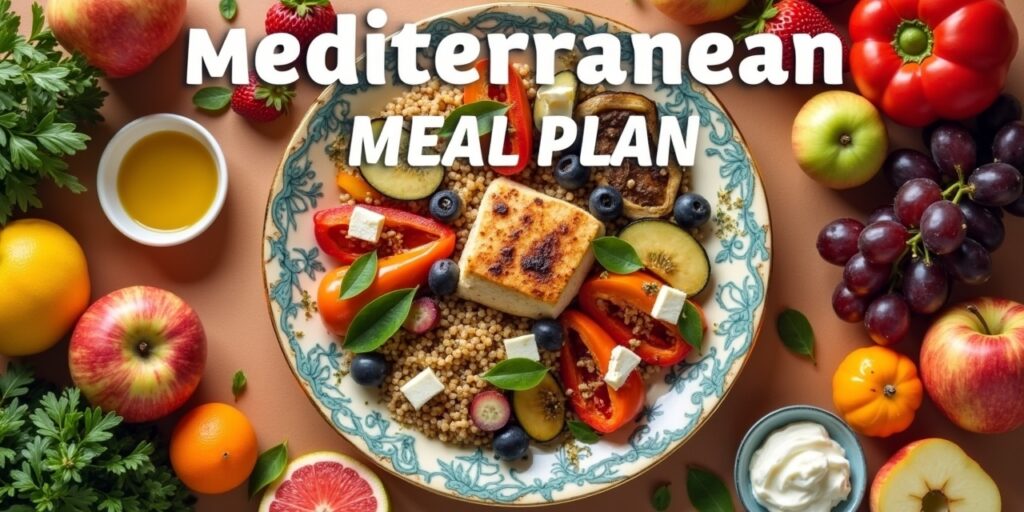
Here’s a sample Mediterranean diet meal plan to get you started:
Breakfast:
- Greek yogurt with fresh berries and a drizzle of honey on top.
- A few almonds.
Lunch:
- I had a salad with grilled chicken, mixed greens, tomatoes, cucumbers, olives, and feta cheese, all dressed with olive oil and lemon.
Snack:
- A small bowl of hummus with sliced carrots, cucumbers, and bell peppers.
Dinner:
- Baked salmon with broccoli, cauliflower, and sweet potatoes on the side.
- Quinoa or whole grain rice.
Dessert:
- Some dark chocolate with at least 70% cocoa.
Mediterranean Diet for Weight Loss:
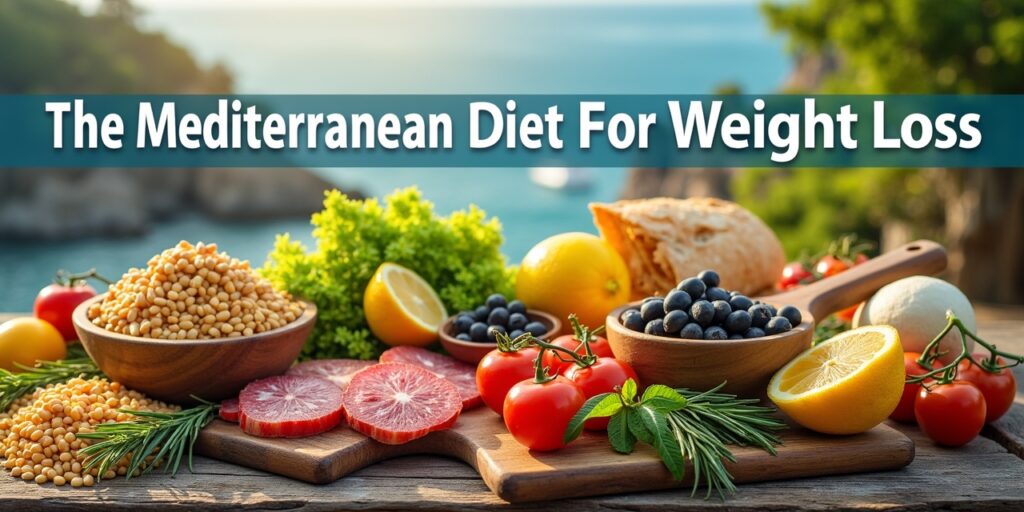
You can lose weight on the Mediterranean diet and still eat delicious food. Eating whole foods, healthy fats, and plant-based foods makes it easier to control how much you eat without feeling deprived. Being aware of what you’re eating and enjoying meals with family and friends are also important parts of the Mediterranean diet. These things help people have a healthy relationship with food.
How to get started:
- Take it easy at first: Switch to the Mediterranean diet gradually. To start, cut back on processed foods and eat whole grains, fruits, and vegetables.
- Stock Your Pantry: with healthy foods like whole grains, nuts, seeds, legumes, and olive oil.
- Plan Your Meals: Plan your meals in advance to avoid last-minute temptations.
- Stay Active: Include regular exercise in your diet. The Mediterranean lifestyle encourages people to walk, cycle, and spend time with friends.
Conclusion:
The Mediterranean diet is not just a way of eating; it’s a lifestyle that emphasizes the importance of making friends, eating well, and staying active. Following this diet can help you lose weight in a healthy way, improve your overall health, and reduce your risk of chronic diseases. So, why not start today? Enjoy the flavors and health benefits of the Mediterranean lifestyle and make a positive difference in your health.
Frequently Asked Questions
Q1. How do you explain the Mediterranean Diet?
People in Greece, Italy, and Spain, which are all near the Mediterranean Sea, have always eaten this way. This is what the Mediterranean diet is based on. It tells you to eat a lot of fresh fruits and vegetables, whole grains, healthy fats (like olive oil), lean proteins (like fish and seafood), and not too much red meat or dairy. People say it helps them lose weight, feels better, and is good for their hearts.
Q2. Does the Mediterranean Diet help you lose weight?
It’s easy to lose weight on the Mediterranean diet, which is based on whole foods that are high in fibre and healthy fats. These foods can help you savour your food longer. A lot less processed foods, unhealthy fats, and refined sugars are also eaten. These are often what make people gain weight. If you watch how much you eat, the Mediterranean diet can help you lose weight in a healthy way that will last.
Q3. Can you eat carbs on the Mediterranean Diet?
Carbs are part of the Mediterranean diet, but they come from whole grains like whole wheat, quinoa, brown rice, and barley. These days, complex carbs are more important than refined grains because they give you steady energy and help keep your blood sugar levels steady. Lots of fibre is found in carbs in the Mediterranean diet. Fibre helps your body digest food and makes you feel full.
Q4. On the Mediterranean Diet, how much olive oil should I eat?
It is mostly made up of olive oil, which is a good source of fat. Use it a lot in the kitchen, on salads, or to cover food. Monounsaturated fats are good for your heart and are found in large amounts in olive oil. Every day, try to eat about 2 to 4 tablespoons of it.
Q5. Can I drink alcohol while on the Mediterranean Diet?
Yes, red wine and other moderate amounts of alcohol are often part of the Mediterranean diet. Red wine has antioxidants and polyphenols that may be good for your heart. Drinking one or two small glasses of wine a day may be a good idea. However, it is important to drink in moderation because too much alcohol can make the diet useless.
Q6. Is it possible for people with diabetes to follow the Mediterranean diet?
Of course, the Mediterranean diet is very good for people with type 2 diabetes. It helps keep blood sugar levels in check because it has healthy fats that make insulin work better and a lot of fibre from vegetables, whole grains, and legumes. It also talks about foods that have a low glycaemic index, which means that they let sugar into the blood more slowly.
Q7. What good things does the Mediterranean Diet do for your heart?
One great way to take care of your heart is to follow the Mediterranean diet. There are a lot of omega-3 fatty acids from fish and monounsaturated fats from olive oil in it. Both of these have been shown to lower LDL cholesterol and heart disease risk. Inflammation is a major cause of heart disease. Fruits, vegetables, and whole grains all have a lot of antioxidants that help lower it.
Q8. Is the Mediterranean Diet hard to follow?
So no, the Mediterranean diet is not hard to follow. It is based on whole, tasty foods that are simple to find. It’s a fun way to eat because you don’t have to give up many foods. The Mediterranean diet can also be changed to fit your tastes and way of life.

